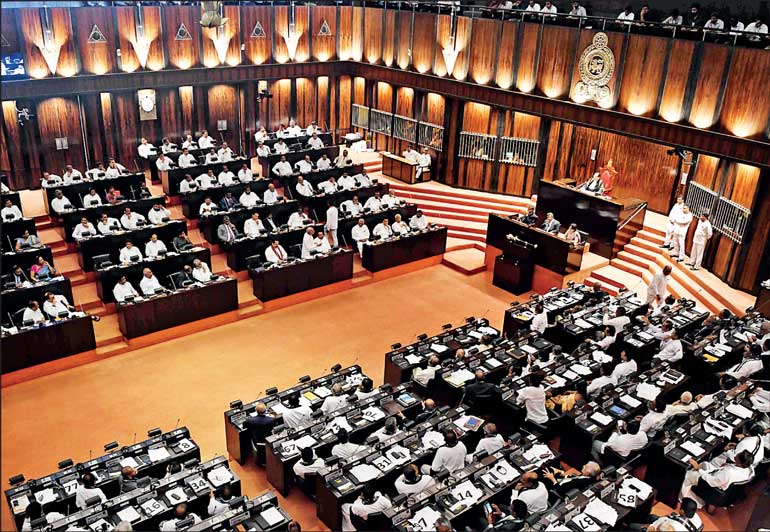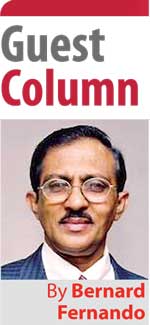Friday Feb 13, 2026
Friday Feb 13, 2026
Saturday, 22 January 2022 00:08 - - {{hitsCtrl.values.hits}}

 The President’s assurance to deliver a ‘people-friendly’ Constitution and an article in the press captioned ‘Constitution-making process’ by a learned person, prompted the writer as a senior citizen cum sovereign voter to pen a transparent procedure as follows, to ensure public/voter participation in ‘people-friendly constitution-making’, using the chapter dedicated to ‘franchise and electoral reforms’ under the proposed new Constitution as an example.
The President’s assurance to deliver a ‘people-friendly’ Constitution and an article in the press captioned ‘Constitution-making process’ by a learned person, prompted the writer as a senior citizen cum sovereign voter to pen a transparent procedure as follows, to ensure public/voter participation in ‘people-friendly constitution-making’, using the chapter dedicated to ‘franchise and electoral reforms’ under the proposed new Constitution as an example.
Preamble
It is public knowledge that initially in 2020, an Eminent Lawyers Committee appointed by the Cabinet was required to submit a draft report on the proposed New Constitution. Thereafter, in 2021 a Parliamentary Select Committee (PSC) of 14 MPs was appointed to identify appropriate reforms for Sri Lanka’s election laws and electoral system. Both committees invited proposals from the public. However, past experience shows that such committees with a few members are not geared to handle large numbers of public proposals effectively.
Be that as it may, let us look at the procedure for the passage of the proposed new Constitution outlined as follows by Parliament former Secy. General Nihal Seneviratne.
“These eminent lawyers would sift through the representations and memorandums received and prepare a draft report which is expected to be submitted to the President. The President is expected to submit the report and draft to the Speaker and the Speaker would submit this report and thereafter appoint a Select Committee comprising members from both the Government and the Opposition. The Select Committee following the usual established procedure would invite representations from the public and would study all these memorandums and submit the report back to Parliament with their recommendation. It would deliberate at length studying all the representations made and submit its final report to Parliament.”
The phrase ‘usual established procedure’ to invite public representations connotes that it is a mere traditional ritual or an ‘Eye wash’ at its best. The reality is, the Parliamentarians acting in collusion as ‘agents/representatives’ of the sovereign voters will, as usual, usurp the powers of the ‘principals’, to bulldoze their way through the ‘parliamentary select committee’ to change the ‘draft report’ to protect their privileges and vested interests especially in relation to ‘electoral reforms’. The process will continue as usual with a two-thirds Parliamentary majority followed by the final ‘eye wash’ of a ‘referendum’ where the innocent and simple voters will be asked to say ‘yes’ or ‘no’ to a question framed according to the whims and fancies again of the politicians.
Thus, it is evident that the sovereign voters who, as ‘principals’, elect politicians as their ‘agents’, have completely lost their supremacy in the ‘principal over agent’ relationship. Obviously, it is due to the highly disproportionate hype, publicity and attention given to empty utterances and false promises of politicians mainly by some media, ignoring valid suggestions and proposals from the sovereign voters in regard to several areas affecting country/public interest. As if adding insult to injury, even some civil organisations dedicated to protect the rights of sovereign voters as well as some officials and ad-hoc review committees guiding the politicians have contributed to the failure to develop a simple, rational, transparent and cost-effective ‘electoral system’ that suits the simple, genuine voters of this small country for the last 73 years. All these frustrations are due to the absence of a robust and transparent procedure to consult the people, at least through the mass media prior to legalising such systems.
In the wake of the President’s latest assurance to deliver a ‘people-friendly’ Constitution, the writer wishes to propose a rational and transparent method to produce such a Constitution using its relevant chapter - ‘Franchise and Electoral Reforms’ - as an example.
A transparent method to produce a ‘people-friendly’ Constitution:
1) As has already been proposed, the President on the advice of the Independent National Elections Commission (NEC) shall set up a Permanent Civilian Taskforce for ‘Electoral Reforms’ comprising, NEC recommended eminent retired Judges and the Academia possessing the requisite expert knowledge together with, ‘sovereign voter dedicated’ organisations (like ‘Paffrel’, CaFFe, CMEV) and other concerned civil rights organisations and activists with practical knowledge as its members. Since matters such as eligibility criteria, selection, nomination procedure and allocation of seats for MPs are some of the crucial aspects in electoral reforms, they would fundamentally be barred from membership in this taskforce owing to the obvious ‘conflict of interest’ and the operation of ‘The Law of Agency’ in correct spirit as aforesaid. Besides, the majority of them lack thorough knowledge of constitution-making. The sad plight of the previous Parliament sitting as a ‘Constitution Assembly’ for four and half years with no result bears ample testimony to this fact.
2) The taskforce shall study the relevant section of the ‘Expert draft Report’ submitted through the President and also the report of the Parliamentary Select Committee and prepare its own draft to be included under the relevant chapter - ‘Franchise and Electoral Reforms’ and submit to NEC.
3) The NEC in turn will wet the draft and in keeping with the principles of ‘People-based Governance’, place its own draft before the people through the mass media in all 3 languages for their final comments and clearance within a specified time frame.
4) Thereafter, the NEC will consider the proposals and comments from the public and prepare the final draft and submit the same to the Supreme Courts for clearance.
5) The same final draft together with Comments/recommendations of the Supreme Courts shall be sent to the Legal draftsman for preparation of the relevant section in the new Constitution.
6) Considering the potential for so-called ‘slips’ occurring between the ‘Cup and the lip’, at different levels, such Final draft of the section prepared by the Legal draftsman as per 5 above should be placed before the people again through the mass media for their final comments, if any, within a specific time frame.
7) Thereafter, the Final document should be placed before the Parliament through the Cabinet solely for formal approval and thereafter, if necessary, go for a ‘Referendum’ on the recommendation of Supreme Courts.
Further recommendations towards the new Constitution
I finally propose that the above transparent method be followed in respect of all other relevant Chapters of the New Constitution within specified time frames to ensure facilitation of a ‘people-friendly’ Constitution of their own making.
As a ‘spin-off’ of this transparent exercise, the people and the politicians themselves will become more conscious and aware of the basic law of the country too.
(The writer is the retired Deputy General Manager of Bank of Ceylon)